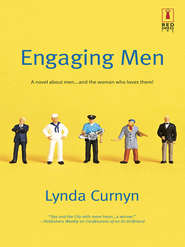По всем вопросам обращайтесь на: info@litportal.ru
(©) 2003-2024.
✖
Killer Summer
Автор
Год написания книги
2018
Настройки чтения
Размер шрифта
Высота строк
Поля
Yaz hadn’t gone to the funeral, mostly because Tom had refused to close the office and Yaz had quickly agreed to stay and answer the phones so everyone else could attend the services. She hadn’t cared much for Maggie, and being a twenty-six-year-old Goth—if a woman as dark and exotic as Yaz was could be a Goth—she wasn’t one to stand on ceremony.
“Tom’s fine,” I said finally. “But you know Tom,” I said.
“Business as usual,” Yaz replied, still staring at me, waiting for what—tears? Shrieks of happiness? Because the truth was, business was back to usual. As in back to the way things were before. Pre-Maggie.
“I’ll be in my office,” I said, needing an escape from the gleam in Yaz’s eyes.
“Sure,” Yaz said with a shrug. Then, “Oh, Sage?”
I stopped mid-escape.
“The samples for the fall line came back yesterday,” she said, her gaze on me once more.
I gave her a quick nod. “Thanks,” I said, then practically ran down the hall to my office.
Once I closed the door behind me, relief washed over me. As I took in my sleek black leather chair, the cool jewel tones I’d chosen for the walls, the way the sun slanted in across my massive desk, I felt, for the first time, a shot of sadness for my former manager.
Which was surprising, considering my office was the only bit of space at the offices of Edge that Maggie hadn’t mutilated with her “flair for decorating.”
Dropping my bag on the desk, I headed for the tall window, gazed out onto the streets, alive with the rush of people scurrying to their offices, clutching coffees and newspapers, already scattering Seventh Avenue with the debris of life.
Gone. She was really gone.
I shivered, remembering how I had, barely one month ago, during a rage over the changes Maggie had requested on my samples, declared to Yaz and anyone else in earshot, “That woman should be shot.”
A knock sounded on my door.
I straightened. Never let them see you sweat. “Come in.”
The door swung open on Shari Werner, my designer, who, standing before me in a black Betsey Johnson dress, was either displaying her usual flair for fashion or was the only one of us who was still in deep mourning. Knowing Shari, whose hands fluttered nervously to her soft auburn locks, it was the latter.
“How are you doing?” she said, her gray eyes wide with sympathy and causing a sudden alarm to go off inside me. I’ll admit, I’m not too good with emotion—mine or anyone else’s.
“I’m fine,” I insisted for the second time that morning.
“Have you spoken to Tom?” Shari asked, making me realize why all this concern was pouring out toward me. Tom and I were friends. Had been even before he’d hired me away from The Bomb. I guess people like Shari assumed that Maggie and I were friends, too. But that was Shari. Always assuming the best of people. She might have been the only employee at Edge who actually got along with Maggie.
“Poor Tom,” she said now, her eyes welling up.
I reached for my coffee, carefully removing the lid and focusing on the fragrant black brew as Shari went on about “the tragedy” and “how young Maggie was, how much life she had ahead of her.”
I swallowed a gulp of coffee, nodding in the appropriate places as I stepped behind my desk, fingering the fat file of orders I had let languish during my absence and even rearranging the pencils in my holder in order to avoid her gaze. When she finally paused in her eulogy, I looked up at her.
“So I understand the samples came back from production?”
Shari’s brow furrowed, as if she suddenly remembered we were no longer at the funeral but back at work, where there were a million more things to do now that everything had nearly come to a standstill over the past few weeks. “Right,” she said, nodding. Then, as if she couldn’t let go of all that Maggie had left behind, she said, “Oh, these are the samples that Maggie redid the merchandising on.”
“Yes they are,” I said, studying her anew. It amazed me that Shari, who had spent months designing the fall/winter line only to have Maggie decide at the last minute to change the details on at least fifty percent of the bodies we had had cut, could feel such a generosity of spirit toward Maggie. But then, I guess one of Shari’s biggest assets as a designer was that she followed orders well. After all, those bodies she had sketched were based on leather jackets and skirts and pants I had bought from the bigger designers and ordered her to knock off, adding, of course, the edge that made Edge unique. But I guess that was why I’d persuaded Tom to hire her. She was easily led. “Could you have Jamal hang them in the first showroom? I’d like to see how they turned out.”
“Of course,” Shari said, nodding fervently. Then she frowned. “Um, they’re all still in the shipping boxes.”
I sighed. “What has Jamal been doing?” Our stock boy was one of the few people who hadn’t attended more than one night of Maggie’s wake, due to claims of college workload and classes. And, as he said to Tom the one night he had shown up, someone had to tend to shipments while we were all gone. But Jamal had never been the most industrious of workers. Mostly because his idea of being in the fashion world was pretending to be P. Diddy. As in gold jewelry, glamorous lifestyle and nothing to do but be his hip-hop self.
Shari’s eyes widened, and I knew her assumption was that Jamal had been properly mourning, just as she had been. “I’ll get him right on it,” she declared. “Shouldn’t take him more than twenty minutes or so.” Then she smiled. “That’ll give you some time anyway. To adjust.”
I raised an eyebrow at her. “Adjust?”
She blushed, making me feel more and more like a beast. “You know, to being back. After everything…”
“Right,” I said, looking down at my file of sales orders. “A lot of catch-up,” I said, nearly cringing as I did.
Shari had the good grace to make her exit, shutting the door firmly behind her.
I sank down in my chair, shoved the file away and put my face in my hands.
The truth was, I didn’t feel like doing anything.
Fortunately, before I could fall into a heap of something that felt vaguely like pity—though I wasn’t clear on what I had to feel sorry about—the phone rang. Assuming it was a client, I picked up, prepared to placate whoever hadn’t received their order this week, and was surprised to find my mother on the other end.
But I shouldn’t have been surprised, knowing my mother.
“Sage, I didn’t think you’d be in today.…”
“Why wouldn’t I be in?”
“Well, wasn’t the funeral yesterday?”
The operative word being yesterday. But my mother was of the school where mourning required at least a lifetime to be done properly. She’d been putting up memorials to Hope ever since my sister had died seventeen years ago. There was the annual “Keep Hope Alive” theater festival in my hometown to raise money for a children’s theater fund in Hope’s name. Though Hope had only been eleven when she died, she had shared my mother’s love of acting. The “Keep Hope Alive” theater fund was a nice gesture, but my mother—and my father, who did lights for the show every year—should have been concentrating their efforts on keeping themselves alive. Between my mother’s nonpaying gig at the repertory theater and my father’s sporadic sales—he was a painter, the kind who made a meager living selling beach scenes in the local gifts shops—they were barely surviving. Which reminded me…
“Did you make that doctor’s appointment?”
“Doctor’s appointment?”
“To have those tests done?”
“Oh, right. Well, Sage, you’ll never believe it, but the pain just went away. It was like a miracle.”
What was really a miracle was that my mother had lived this long, considering she and my father had forsaken all the necessities of life—like health insurance—in the name of living the same life they had when they met in a commune in the sixties. They had left the commune shortly after I was born, even gave in to bourgeois life enough to marry some time after my second birthday and settle down—as much as two bohemians who still thought it was the sixties could settle down—in a small house in Babylon, Long Island. The house was the only thing that saved them, really. They’d bought it for a song when Babylon was more undesirable marina than valuable waterfront real estate.
I sighed, long and deep. “Mom, that doesn’t mean you shouldn’t have it checked out. I sent you a check over a month ago to pay for the exam.”
“Oh, Sage, I really did appreciate your gift. We put that money to good use,” she said happily. “We had the floors fixed in Charlie’s apartment. After the laundry room flooded, they were all warped, and you know Charlie’s got that bum leg.…”
I wanted to argue that Charlie, their longtime tenant who lived in the basement, should perhaps pay for his own new floors, considering that he hadn’t paid his rent in the three months since he lost his job. But it was pointless. My parents were of the belief that what goes around comes around. The problem was, it seemed there was often more going than coming.
As if she picked the thought out of my head, my mother continued, “Don’t worry, Sage. We only paid for the materials. Charlie did the work himself. He’s so handy that way. We’re lucky to have him. Do you know he’s going to repaint the living room for us with some of his friends? We’re going to have a little paint party. Barbecue. You should come out for it.”
No thanks. I generally avoided the frequent parties my parents threw, mostly because I found them stressful. The last time I had given in and attended, one of their hippie friends—after one too many bong hits—had gotten it into his head to start a bonfire in the yard and nearly set the tool shed on fire in the process. It was too much work to be around my parents and their friends because someone had to be the sane one, and in their circle of hippie artist (read: jobless) friends, somehow it always wound up being me.








